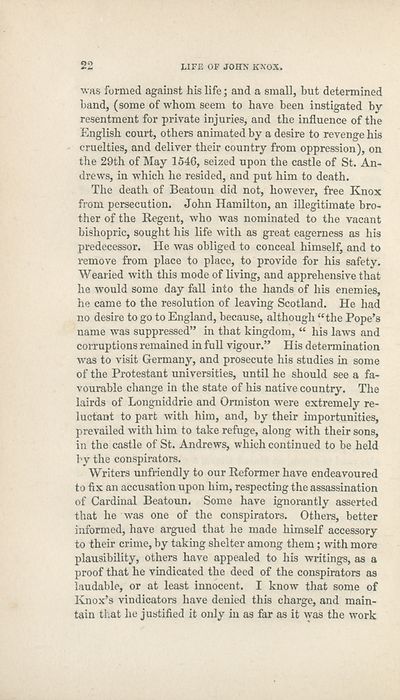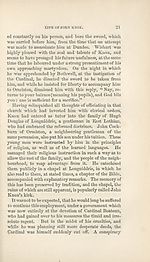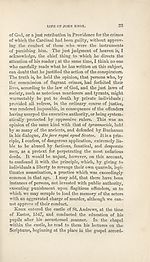Download files
Complete book:
Individual page:
Thumbnail gallery: Grid view | List view

22
LIFE OF JOHN KNOX.
was formed against his life; and a small, but determined
band, (some of whom seem to have been instigated by-
resentment for private injuries, and the influence of the
English court, others animated by a desire to revenge his
cruelties, and deliver their country from oppression), on
the 29th of May 1546, seized upon the castle of St. An¬
drews, in which he resided, and put him to death.
The death of Beatoun did not, however, free Knox
from persecution. John Hamilton, an illegitimate bro¬
ther of the Regent, who was nominated to the vacant
bishopric, sought his life with as great eagerness as his
predecessor. He was obliged to conceal himself, and to
remove from place to place, to provide for his safety.
Wearied with this mode of living, and apprehensive that
he would some day fall into the hands of his enemies,
he came to the resolution of leaving Scotland. He had
no desire to go to England, because, although “the Pope’s
name was suppressed” in that kingdom, “ his laws and
corruptions remained in full vigour.” His determination
was to visit Germany, and prosecute his studies in some
of the Protestant universities, until he should see a fa¬
vourable change in the state of his native country. The
lairds of Longniddrie and Ormiston were extremely re¬
luctant to part with him, and, by their importunities,
prevailed with him to take refuge, along with their sons,
in the castle of St. Andrews, which continued to be held
by the conspirators.
Writers unfriendly to our Reformer have endeavoured
to fix an accusation upon him, respecting the assassination
of Cardinal Beatoun. Some have ignorantly asserted
that he was one of the conspirators. Others, better
informed, have argued that he made himself accessory
to their crime, by taking shelter among them; with more
plausibility, others have appealed to his writings, as a
proof that he vindicated the deed of the conspirators as
laudable, or at least innocent. I know that some of
Knox’s vindicators have denied this charge, and main¬
tain that he justified it only in as far as it was the work
LIFE OF JOHN KNOX.
was formed against his life; and a small, but determined
band, (some of whom seem to have been instigated by-
resentment for private injuries, and the influence of the
English court, others animated by a desire to revenge his
cruelties, and deliver their country from oppression), on
the 29th of May 1546, seized upon the castle of St. An¬
drews, in which he resided, and put him to death.
The death of Beatoun did not, however, free Knox
from persecution. John Hamilton, an illegitimate bro¬
ther of the Regent, who was nominated to the vacant
bishopric, sought his life with as great eagerness as his
predecessor. He was obliged to conceal himself, and to
remove from place to place, to provide for his safety.
Wearied with this mode of living, and apprehensive that
he would some day fall into the hands of his enemies,
he came to the resolution of leaving Scotland. He had
no desire to go to England, because, although “the Pope’s
name was suppressed” in that kingdom, “ his laws and
corruptions remained in full vigour.” His determination
was to visit Germany, and prosecute his studies in some
of the Protestant universities, until he should see a fa¬
vourable change in the state of his native country. The
lairds of Longniddrie and Ormiston were extremely re¬
luctant to part with him, and, by their importunities,
prevailed with him to take refuge, along with their sons,
in the castle of St. Andrews, which continued to be held
by the conspirators.
Writers unfriendly to our Reformer have endeavoured
to fix an accusation upon him, respecting the assassination
of Cardinal Beatoun. Some have ignorantly asserted
that he was one of the conspirators. Others, better
informed, have argued that he made himself accessory
to their crime, by taking shelter among them; with more
plausibility, others have appealed to his writings, as a
proof that he vindicated the deed of the conspirators as
laudable, or at least innocent. I know that some of
Knox’s vindicators have denied this charge, and main¬
tain that he justified it only in as far as it was the work
Set display mode to:
![]() Universal Viewer |
Universal Viewer | ![]() Mirador |
Large image | Transcription
Mirador |
Large image | Transcription
| Antiquarian books of Scotland > Scotland/Scots > Life of John Knox ; and, The life of Alexander Henderson > (40) |
|---|
| Permanent URL | https://digital.nls.uk/131832784 |
|---|
| Description | Thousands of printed books from the Antiquarian Books of Scotland collection which dates from 1641 to the 1980s. The collection consists of 14,800 books which were published in Scotland or have a Scottish connection, e.g. through the author, printer or owner. Subjects covered include sport, education, diseases, adventure, occupations, Jacobites, politics and religion. Among the 29 languages represented are English, Gaelic, Italian, French, Russian and Swedish. |
|---|

